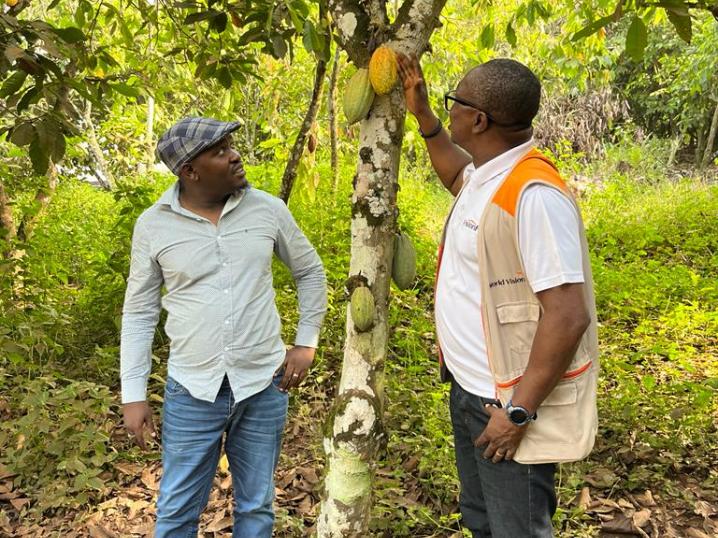Growing Deep to Reach Wide: Inside VisionFund Ghana’s Agricultural plan

Ghana’s agricultural landscape is impressive. A diversity of crops and favourable climatic conditions have enabled a vibrant agricultural sector and a seeming abundance of food in many rural areas.
It’s in this setting that VisionFund Ghana is leading the way in developing and implementing an agriculture master plan, which reflects a wider organisational intentionality to grow agriculture portfolios to levels reflective of the potential in Ghana.
The diversity of crops at farm level are extensive. Cocoa, Rice, Maize, Plantain, Soya Bean, Yams, Sesame, and Palm Oil are among those profiled by the Ministry of Food and Agriculture in 2021. It was found that 12 food crops, three industrial crops, and five livestock value chains, as well as aquaculture are the main contributors.
The seeming abundance of food in rural areas is not reflected in urban areas, where food prices are disproportionately high. Yet farm gate prices continue to be low, contributing to the very low incomes from farm yields.
The sector has not attracted capital in the way that trade, manufacturing, and transport have. However, VisionFund Ghana has identified an opportunity to do more in growing the agriculture portfolio through provision of quality loans.
We are deliberately ‘growing deep to reach wide.’
This means that while there are 20 value chains that make up the market, VisionFund Ghana is ‘exhausting the known before going to the unknown.’
Alongside Cocoa, rice is one of the most organized value chains in Ghana. There are several rice-growing schemes through which the government invests in technical expertise and input provision, something that guarantees consistency in quantity and quality.
However, farmers are only able to cultivate less than 50% of their farms for several reasons, including low and fluctuating farm gate prices and limited working capital.
VisionFund Ghana is already lending into the rice value chain, enabling these problems of production to be easily solved.
The remaining issue is the supply chain breakdown – the path from government warehouses to markets, an issue requiring policy intervention by the government.
Actors in this space, including World Vision Ghana, can influence and canvas for streamlined markets and market access for Ghanaian rice farmers, so influencing production quantity and quality. This would release Ghanaian producers and processors to supply the national, regional, and international markets to a much greater extent.
VisionFund Ghana is embarking on a seven-year master plan that will intensify agriculture financing.
In the interim, we are committing to increase lending activity in the rice value chain while working with Bontanga Irrigation Scheme. This oversees 900 farmers cultivating across 900 hectares of usable land. Only 255 farmers are involved, each tending to approximately two hectares – a total of 495 hectares under cultivation.
In following the “known to unknown” approach, VisionFund Ghana will extend to working with other irrigation schemes, including Kpon, Tono, Veta, and Aveime, all operating with comparable business models.
In the medium term, VisionFund Ghana will be focusing on three value chains, Rice, Cocoa, and Soya Bean. This will allow a deeper understanding of these value chains, and increased farmers from region to region.
World Vision Ghana plans to conduct market assessments and value chain analyses under THRIVE 2030. VisionFund Ghana will be prepared with these initial value chains, whose structures can be mapped and partnerships established.
VisionFund Ghana has also been constrained by its type of money lending license, which limits loan sizes to a ceiling of GHS 20,000. But plans are underway to acquire a savings and loans license, which will open other horizons and remove the loan size limit. This will allow VisionFund Ghana to venture into substantive asset finance business, which has immense opportunities in the agriculture sector.
As VisionFund Ghana institutes a master plan, we believe we will see strong returns in the form of intensity in Agriculture.